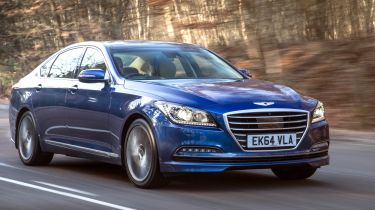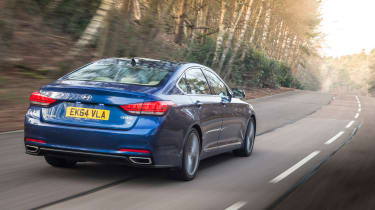Hyundai Genesis saloon (2014-2017) - MPG, running costs & CO2
The Hyundai Genesis is only available with a thirsty petrol engine, so running costs are high
The absence of a diesel engine is arguably the Hyundai Genesis’ biggest weakness. The Genesis is only available with a powerful 3.8-litre V6 petrol, so you can expect to become very familiar with your local petrol station should you decide to buy one.
Private buyers will be concerned by the car’s predicted residual values, too. The Genesis looks like good value at first, but when you consider how quickly the big saloon loses value after you buy it, cars like the BMW 5 Series and Audi A6 start to look like a safer long-term investment. They’ll hold on to a bigger proportion of their value and are likely to be worth more after three years of ownership. Even a Volkswagen Phaeton is likely to depreciate more slowly.
Hyundai Genesis MPG & CO2
The Genesis saloon will return a claimed 24.4mpg and in the real world we managed to get fairly close to this, achieving 20mpg exactly. CO2 emissions are high at 261g/km. In comparison, the most powerful regular Mercedes E-Class saloon (the E350 BlueTEC) returns 53.3mpg and even the E63 AMG high-performance version manages more than 28mpg.
Insurance
A powerful V6 engine means the big Hyundai isn’t going to be a cheap car to insure – but neither are many of its rivals in the class. The Mercedes E-Class, for instance, falls into groups 40-49, which is almost as high as you can get. The Genesis itself is in group 42.
Warranty
All Hyundai cars benefit from a generous five-year/unlimited-mileage warranty, so high-mileage drivers won't lose out as they often do with other manufacturers.
Servicing
The Genesis has a service interval of every 20,000 miles or once a year, whichever comes up sooner. The services alternate between major and minor, but you don’t need to worry about the cost, as a five-year servicing package is provided free of charge for the Genesis.











